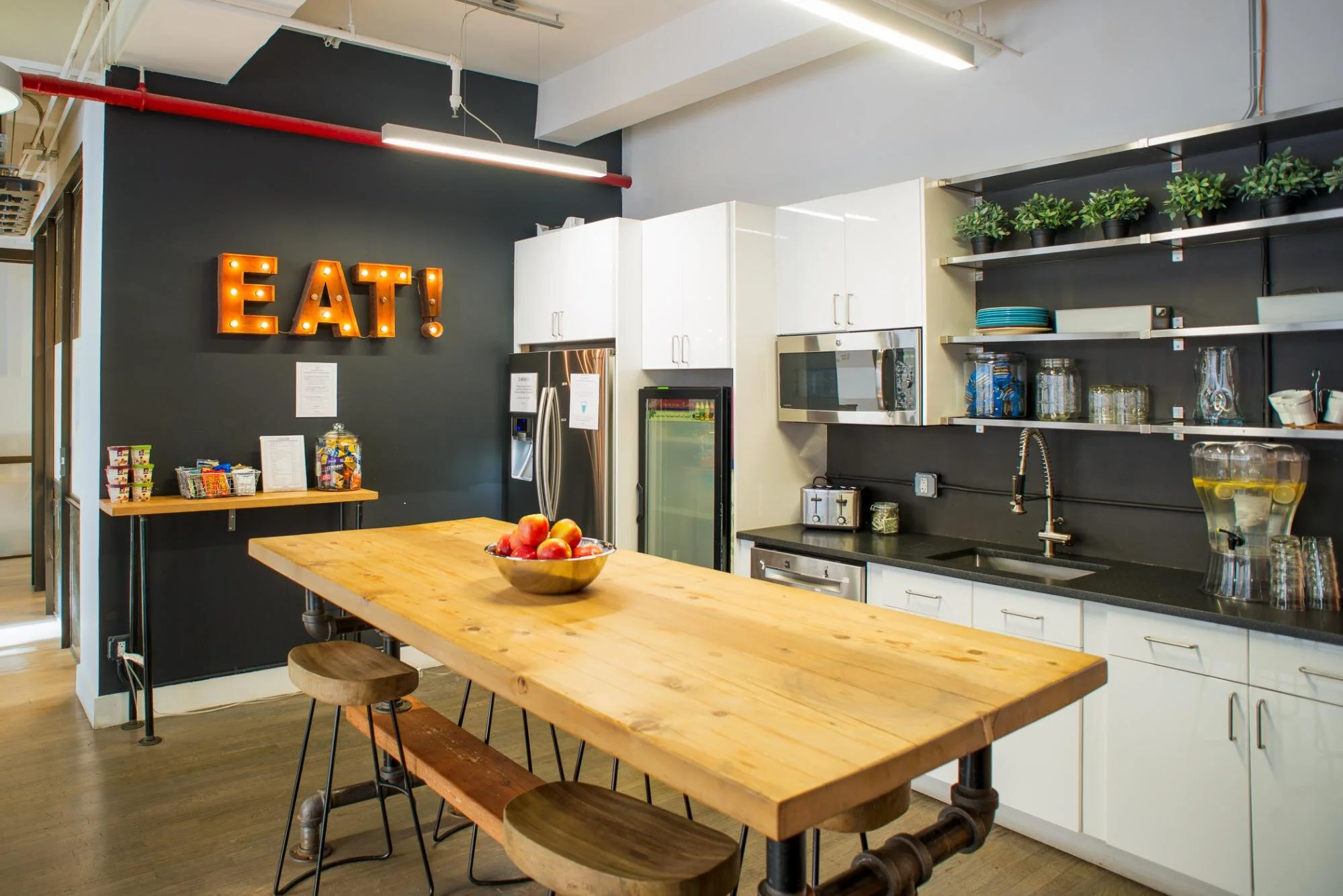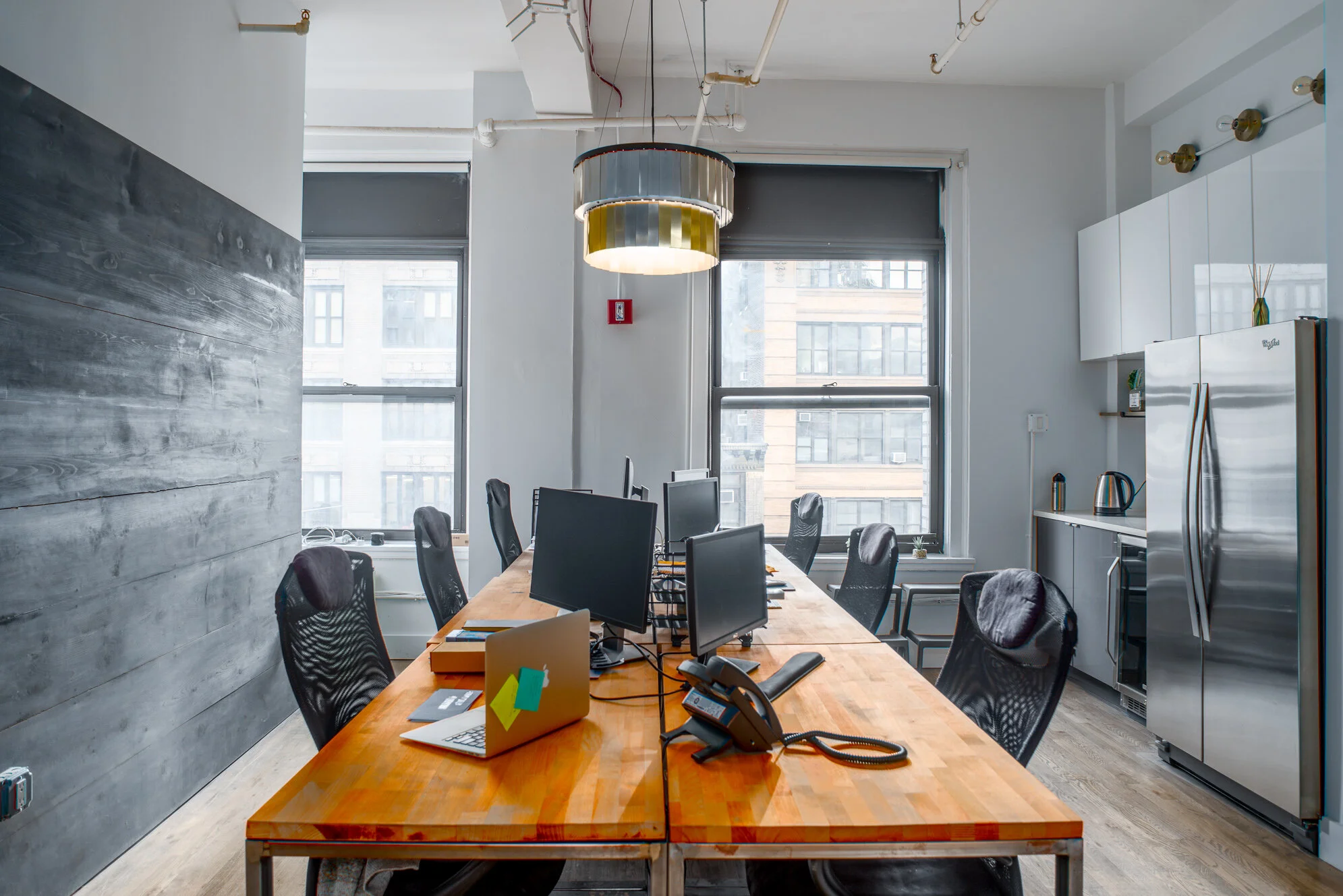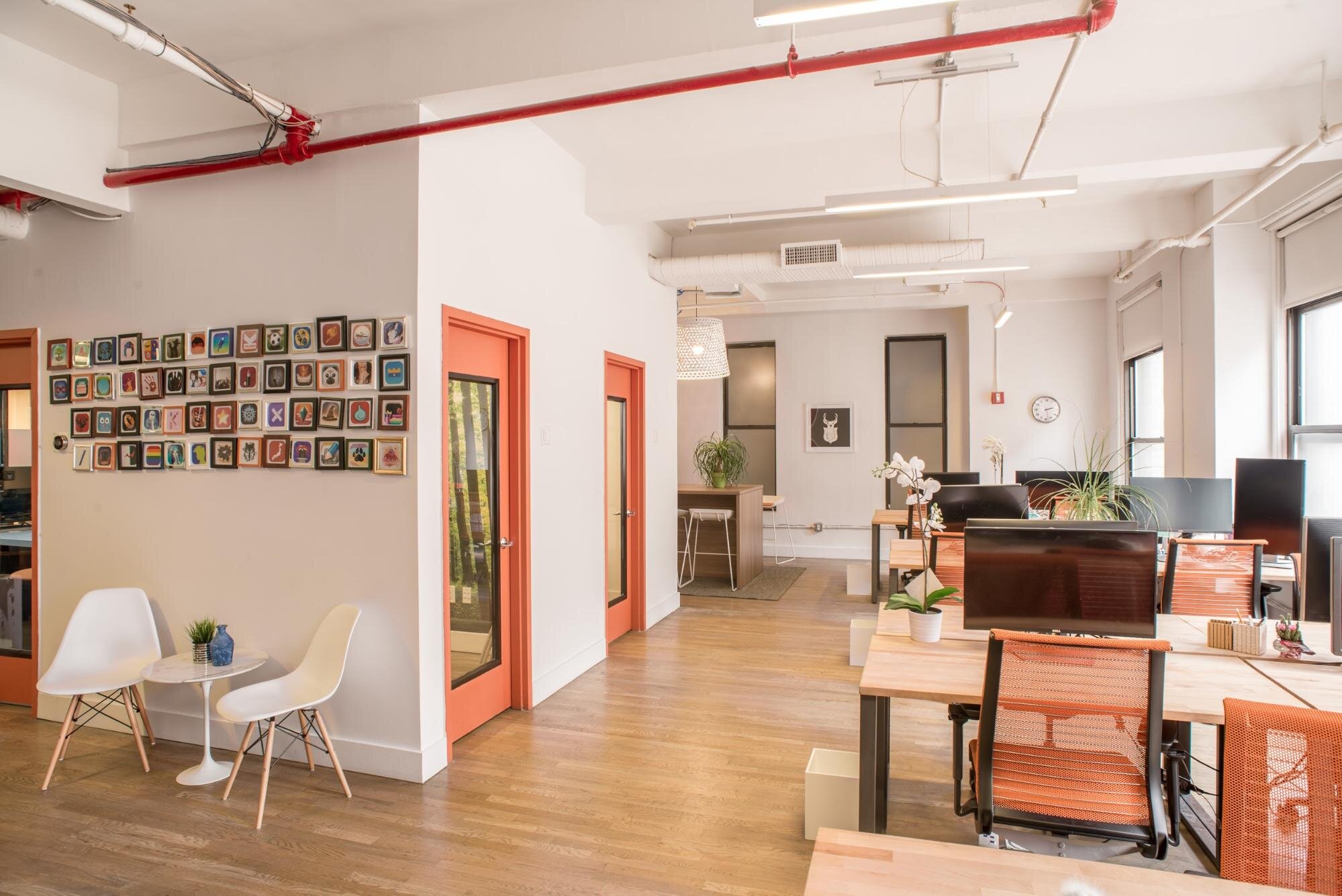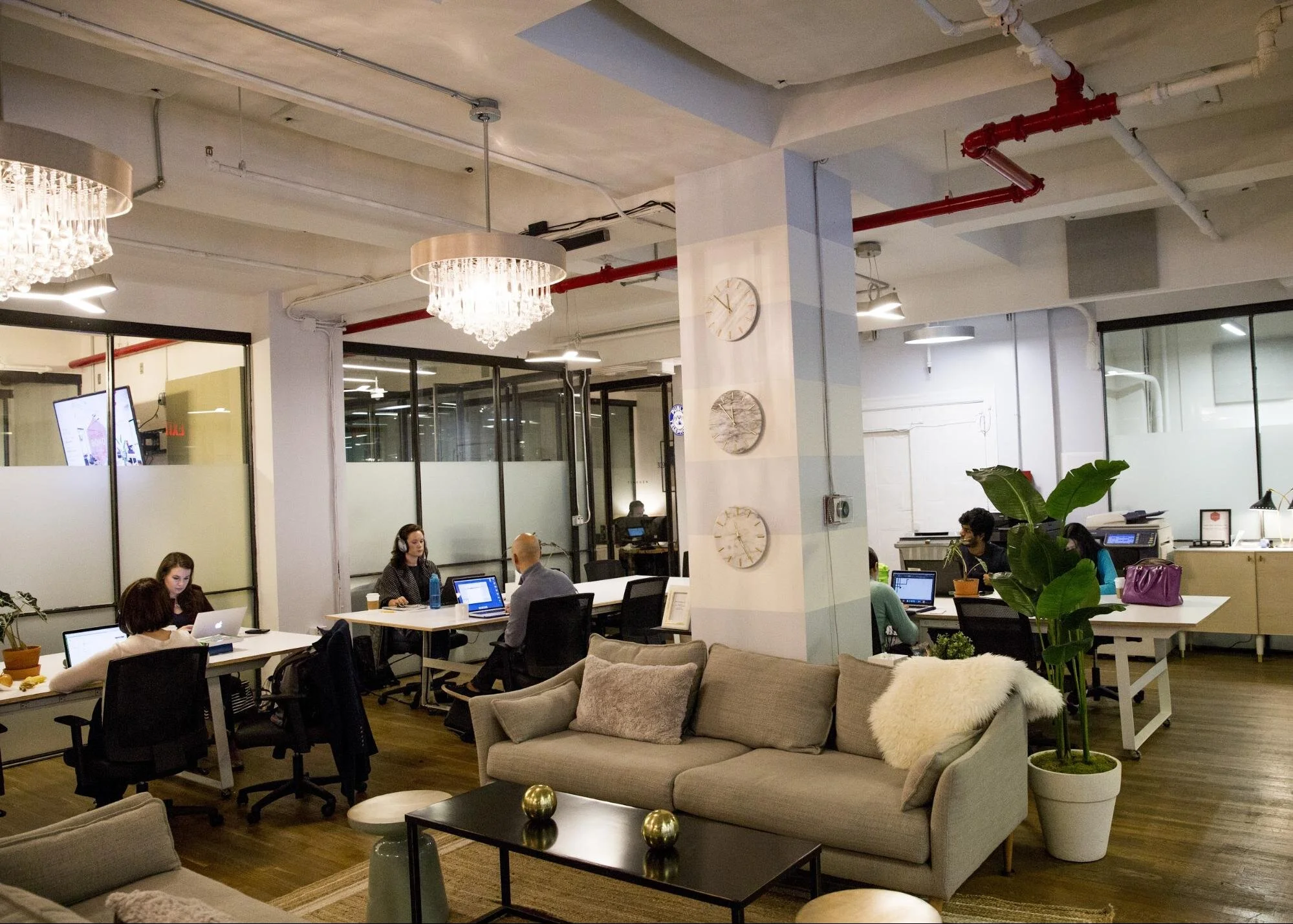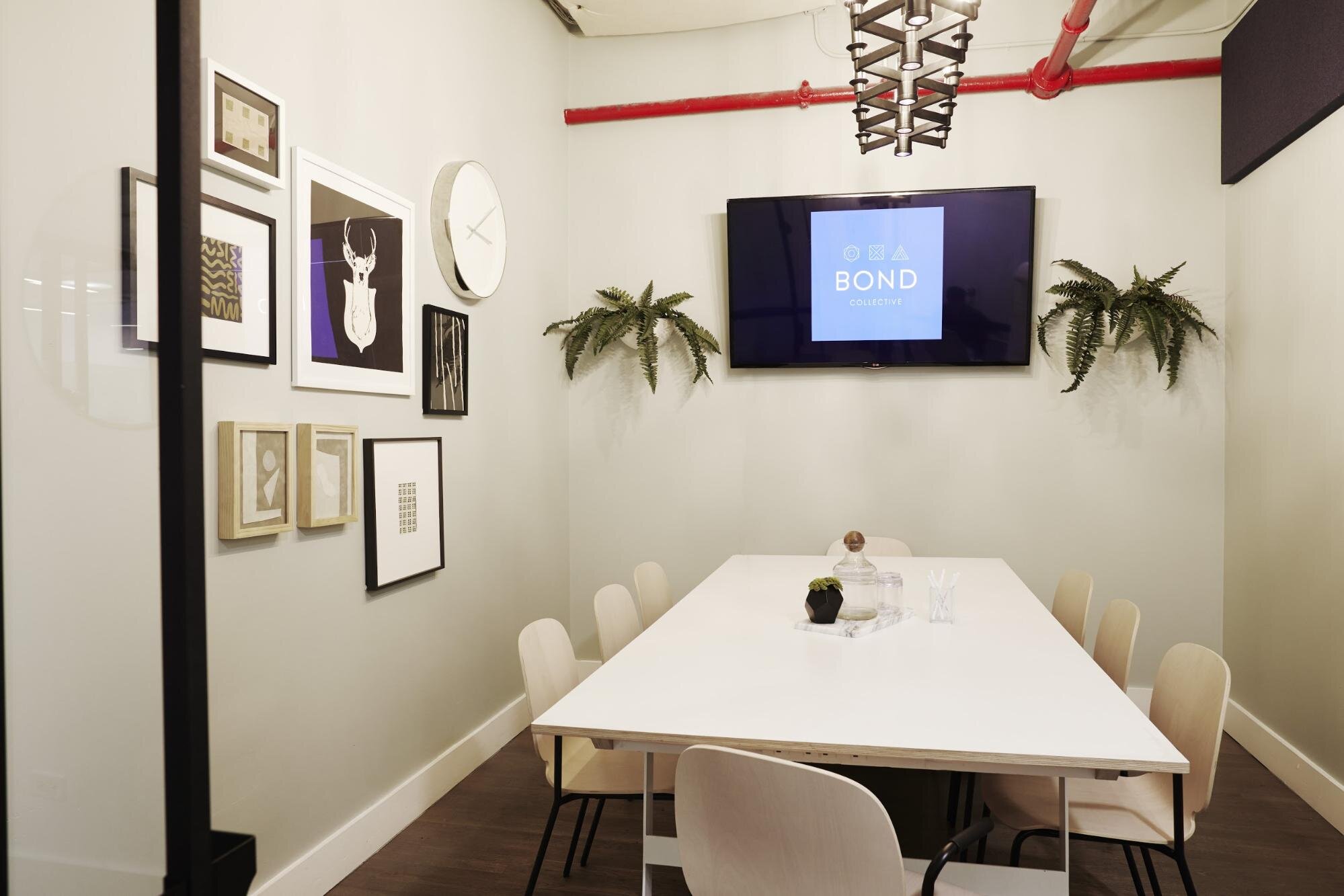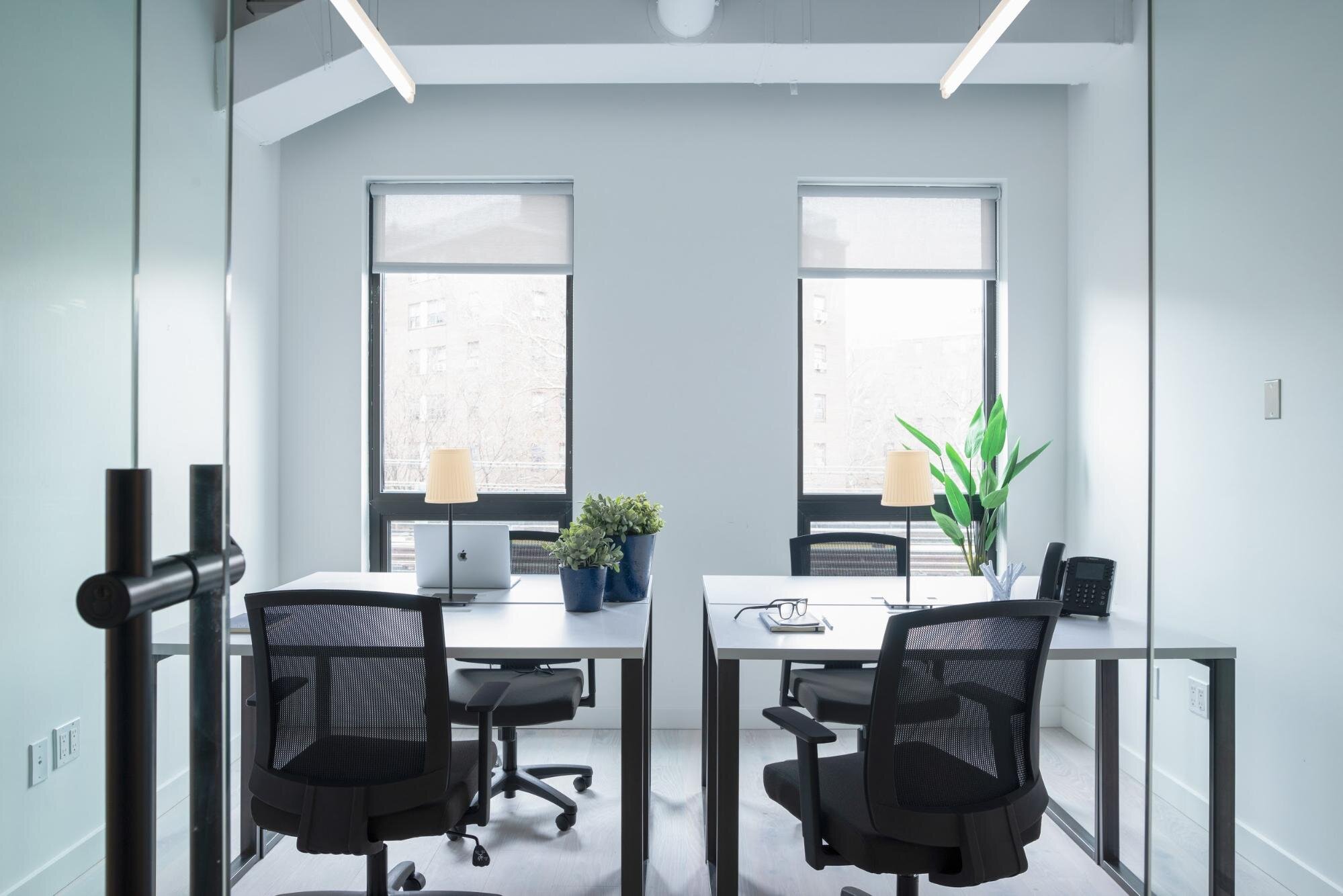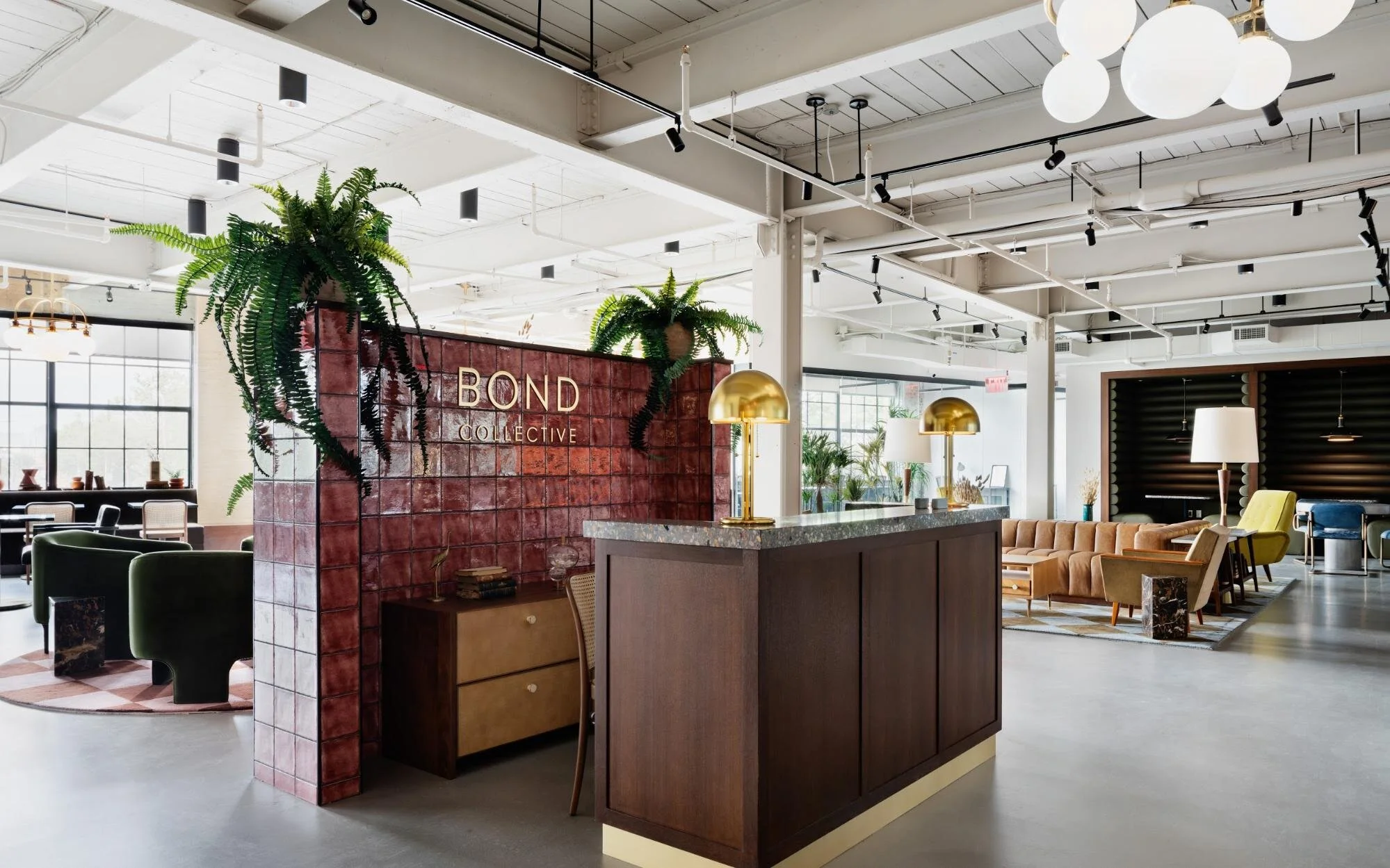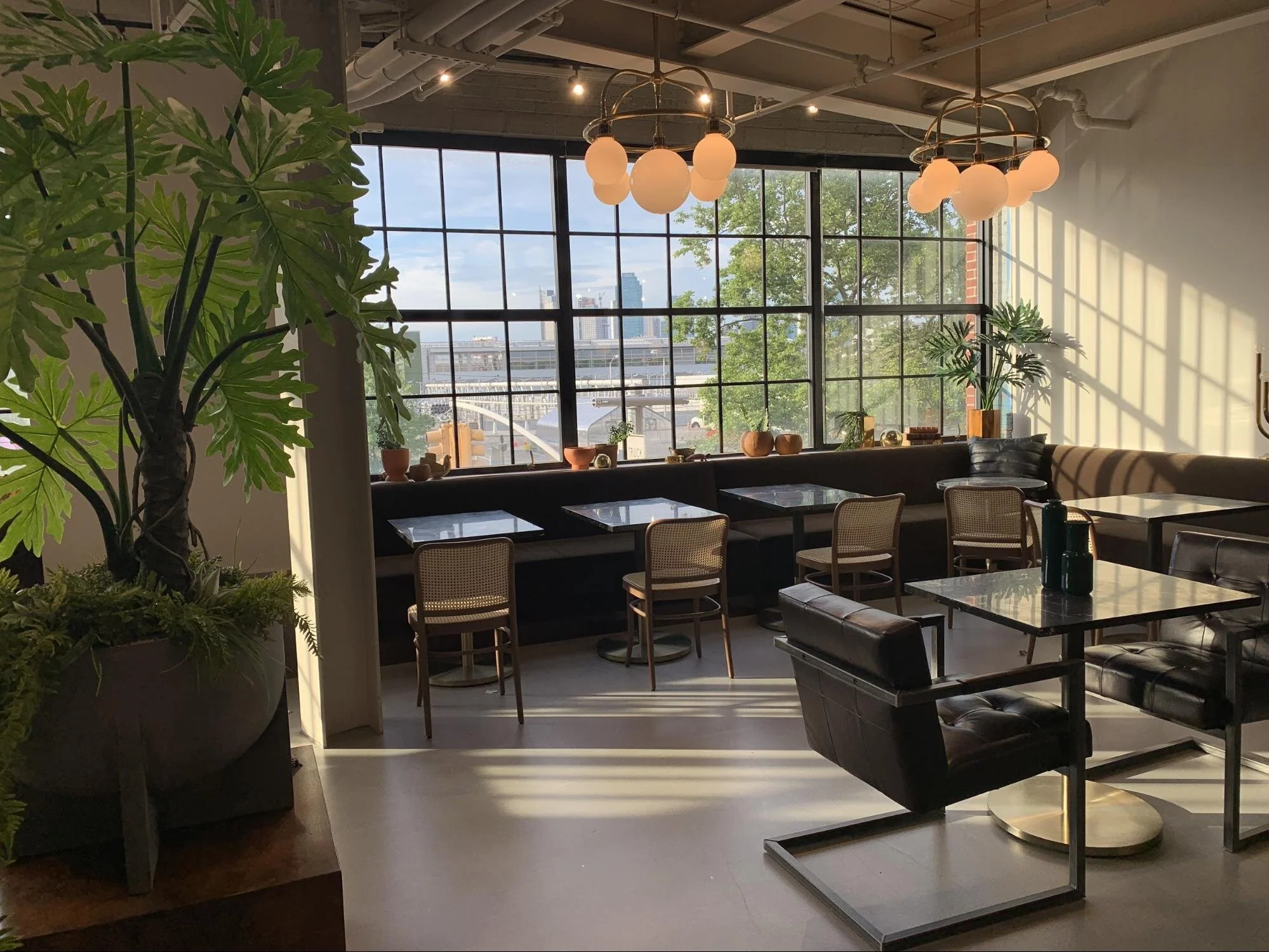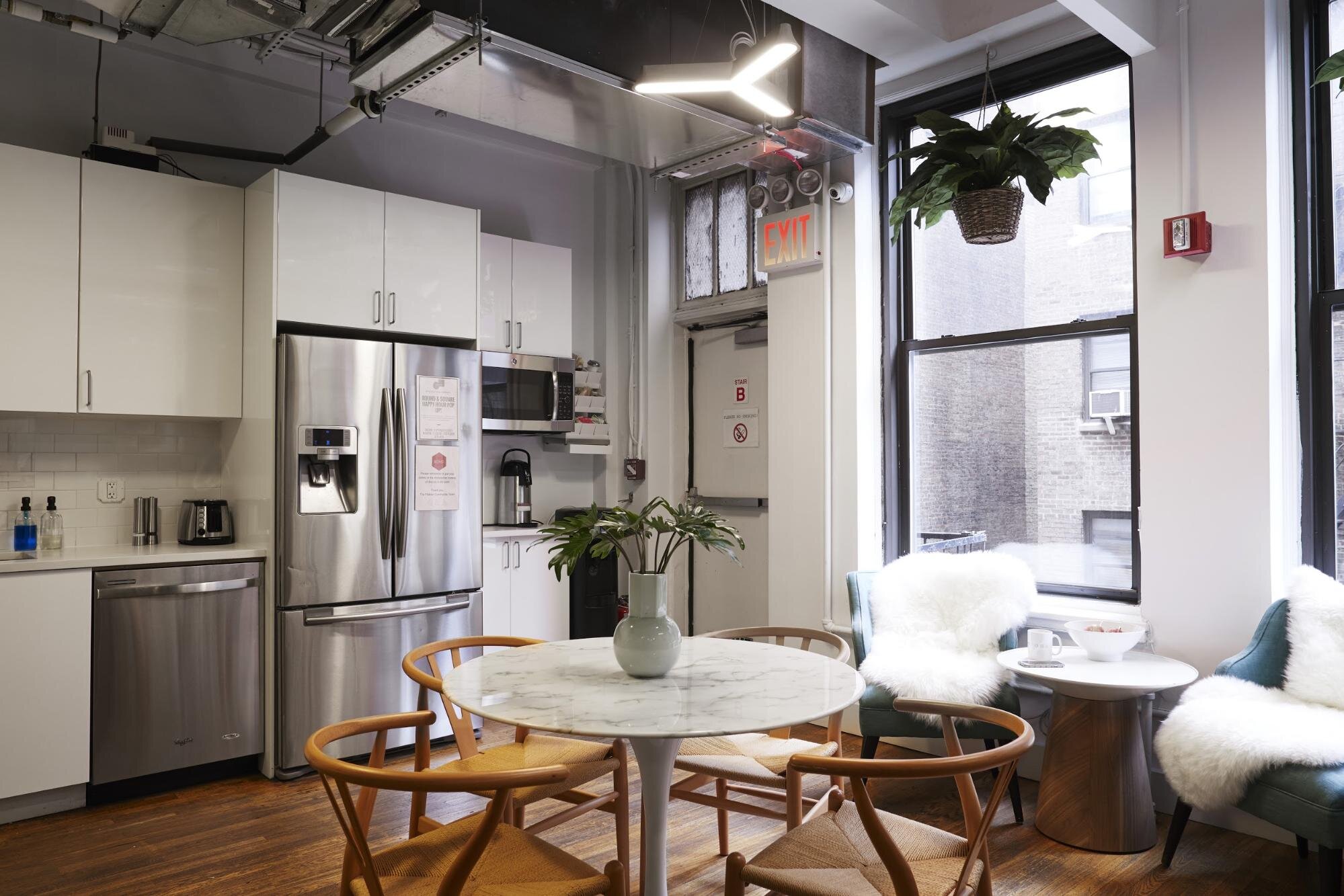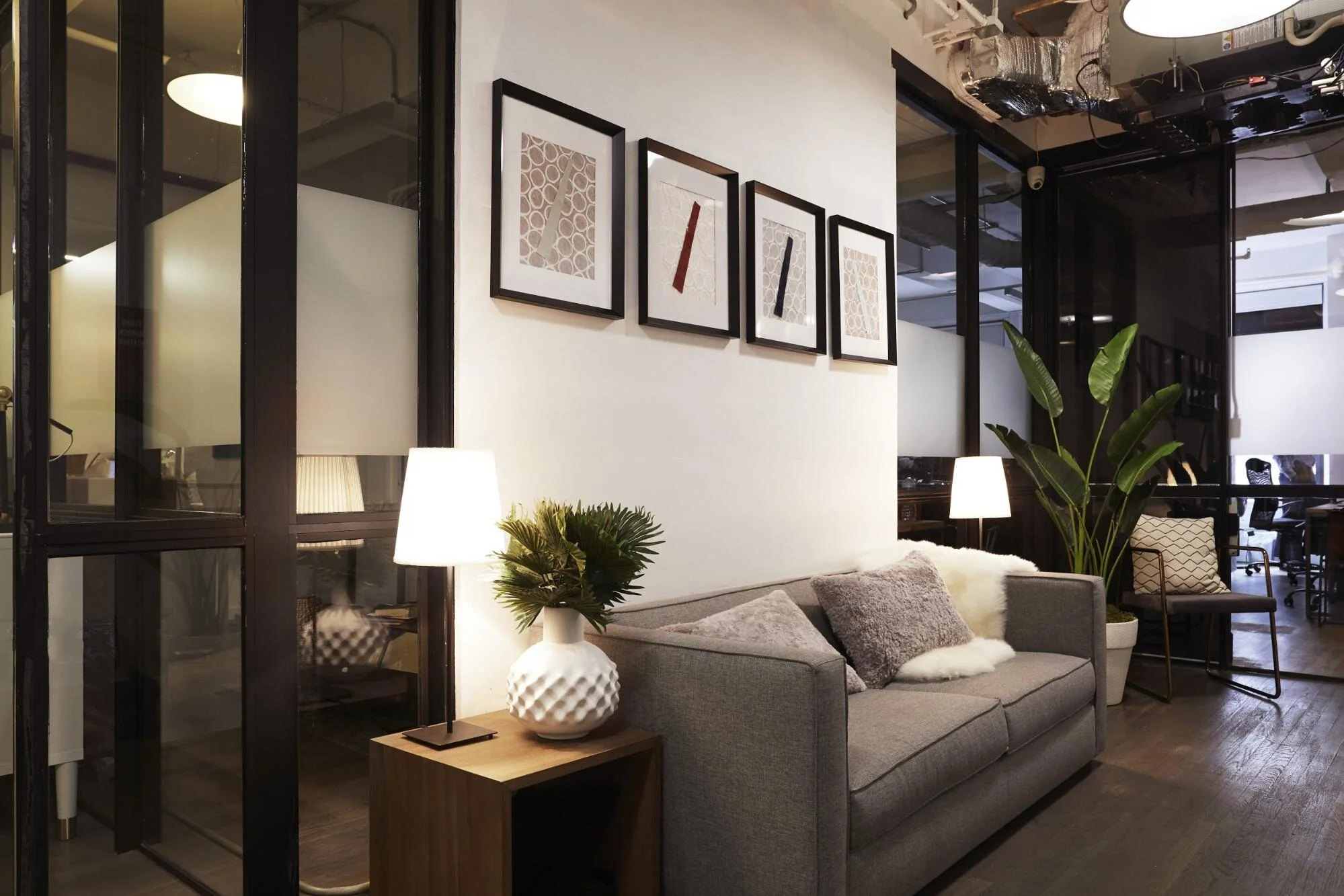By Bond Collective Staff
Flexible office space isn’t just for freelancers, entrepreneurs, and startups anymore. Businesses of all sizes — even large, multinational companies — can benefit from what this unique workspace option has to offer.
In this article, the experts at Bond Collective discuss how to take advantage of flexible office space to inspire your team, improve your bottom line, and, ultimately, grow your business.
What Is Flexible Office Space?
Flexible office space is an umbrella term used to describe a variety of workspace types that differ from the traditional office model of one business, one space.
In the flexible office space model, numerous businesses, individuals, and teams work alongside each other in a large, communal area. These communal areas often have multiple seating options, including:
-
Private offices
-
Conference rooms
-
Reserved desks
-
Lounge areas
-
First-come, first-served desks (a.k.a. hot desks)
Theoretically, then, within a flexible office space, you could encounter businesses (or teams from businesses) of all sizes — from a large, international company (who perhaps owns the space) right down to a solopreneur just getting started or a freelancer who doesn’t want to work from home or the local coffee shop.
Flexible office space goes by many different names, including:
As the niche for flexible office space continues to grow, other names will undoubtedly emerge, but they all refer to the same thing: a workspace where many different businesses, teams, and individuals work alongside each other, sharing resources, knowledge, and sometimes inspiration.
The Main Types Of Flexible Office Space
Coworking Spaces
Coworking is the use of an office space or other working environment by people who are self-employed or working for different employers, typically so as to share equipment, ideas, and knowledge.
Within each coworking space, you’ll find community spaces, hot desks (available on a first-come, first-served basis), dedicated desks (i.e., reserved), private offices, conference and meeting rooms, private phone booths, and much more, just like the coworking space in DC.
Executive Suites
Executive offices or suites — as their name suggests — feature a layout with more offices than communal spaces. This provides a more private and professional setting than coworking.
Executive suites may still offer public lounge areas, shared technology and infrastructure, and other amenities like coworking spaces, but the executive suite model keeps business activities self-contained and insulated from those not employed by the company.
Incubators
Incubators are workspaces designed to provide enhanced resources, mentorship, and early-stage funding to startups and entrepreneurs.
Incubators may take advantage of the privacy inherent in the execute suite model or opt instead for the more-community-oriented coworking model.
Either way, multiple businesses, individuals, and teams work in close proximity in order to share resources and thrive off each other’s motivation.
Combination Spaces
Some flexible office spaces — like Bond Collective — combine all the different models into one unique option.
In these types of combination workspaces, you can benefit from the flexibility of choosing to work from a community space, a private office, or a suite of private offices — all on a short-term basis that provides maximum agility for your growing business.
Combination flexible office spaces like Bond Collective even provide curated events to help your business grow and give you the opportunity to network and find mentors of your own.
Benefits Of Flexible Office Space
1) Reduced Occupancy Costs
The cost of finding, leasing, and equipping your own office space in today’s market is astronomical. This makes it cost-prohibitive for all but the largest companies.
And whether you own the building or you’re merely renting, the advantages of the flexible office space quickly manifest themselves as reduced occupancy costs.
As an established business, sharing your space with other businesses, teams, and individuals helps you eliminate resources that may have been going unused (i.e., empty offices).
As a nascent business, flexible office spaces give you the opportunity to work from an attractive, fully furnished workspace at a fraction of the cost of leasing your own building.
2) Increased Agility
Whether your business is just getting started or you’ve been at it for many years, growth and decline come in cycles and can strike when you least expect it.
In growth years, you need more employees to handle the load. In other cases, you may need to streamline your workforce so as not to hemorrhage funds that you can put to better use elsewhere.
That’s why it’s vital that your business maintain a modicum of agility. Taking advantage of flexible office space gives you that agility.
Bond Collective, for example, makes it easy to expand or contract your workspace footprint from one month to the next. You can work from a dedicated desk in February and March, upgrade to a private office in April, May, and June, and then downgrade to a first-come-first-served desk in July.
3) No Long-Term Leases
Shackling your new business with a long-term lease can lead to financial difficulties down the road. You can avoid this pitfall by taking advantage of the short-term leases that most flexible office spaces offer their members.
A month-to-month agreement, for example, can save you much-needed funds when the market drops, income goes down, and your staffing needs decrease. In those cases, you can reduce the amount of flexible office space you occupy and save money.
With a long-term lease, you are locked in to a set payment that won’t change as the market changes. That can be a real issue when times get lean and you need to conserve your cash for other, more important expenses.
4) Protection From Market Volatility
As we’ve touched on throughout this list, flexible office space offers a unique benefit that you can’t find in other workspace options: protection from market volatility.
Whether it’s unused square-footage, the need for more or fewer team members, or just conserving capital for the next stage of development, flexible office spaces can protect your business from the ups and downs of your industry.
In a flexible office space like Bond Collective, your business will be more nimble. This ability to react to change — be it good or bad — can give you a leg-up over your competitors who are more exposed to the vicissitudes of the market because their money is tied up in a long-term lease.
5) New Markets
For a growing business, there are few things more nerve-wracking than expanding into new geographic markets. Whether it’s a move across town or across the country, flexible office spaces can help reduce the risk involved in setting up a new base of operations.
With Bond Collective, for example, your Texas-based business can occupy a private office in New York City while it investigates the feasibility of opening a branch in the area.
If the expansion is viable, you can increase your workspace footprint as necessary. If the expansion isn’t viable, you can return to your main headquarters no worse for wear.
You can’t do that with a long-term lease.
6) Professional Image
Many businesses restrict their professional image to the lobby or entryway in order to wow customers and clients. Seldom does that professional image extend to the places where your team does the bulk of the work.
This can cause problems down the road when clients and investors want to “look under the hood,” so to speak.
But when you base your business in a flexible office space, a professional image comes standard.
At Bond Collective, for example, all members benefit from guest reception, luxury decor, comfortable workspaces, and 24-hour access to conference rooms.
With a flexible office space like this, you can focus on keeping your teams productive without sacrificing the professional image you need to succeed.
How To Create Flexible Office Space
1) Group Workstations Together
When most people think about flexible office space, they envision long tables of designated workspace, like cubicles without the walls. But this isn’t the best arrangement for productivity.
Instead of row-after-row of workstations, group two, three, or four desks into “pods.”
This type of setup minimizes the localized noise pollution that can cause team members to lose focus and provides a bit of empty space between stations so employees don’t feel like sardines in a can.
2) Keep High-Traffic Areas Clear
When setting up your flexible office, keep high-traffic areas clear. You may be tempted to wedge a few more workstations into or near common spaces, but that is a mistake.
Areas around bathrooms, kitchens, breakrooms, elevators, and stairs are full of distractions and are not conducive to focus and productivity.
Keep those public spaces clear and allow them to do what they were designed to do: handle the high traffic of a busy office.
3) Establish A Quiet Place
When setting up a flexible office, think in terms of zones of specific types of work. Chief amongst those zones is the quiet space.
Yes, a big part of the way your business works depends on team collaboration. As such, you want plenty of space to facilitate that activity.
Equally important, though, is providing a place for team members to go when they need to focus on a single task and work by themselves. That’s what the quiet space is for.
Locate said quiet space so that it is as far away from the “collaboration zone” as possible. You may even go so far as to wall it off to cut the noise and distraction completely.
At the very least, consider delineating the space between quiet and collaboration with tall plants, bookcases, or other sound and visual breaks.
4) Set Aside Space For Phone Calls
Few things are as disruptive as phone calls within a busy office.
Employees using a phone often talk loudly in order to be heard — even if it’s not necessary — and it’s very difficult to break that habit. All that loud talking can seriously disrupt the other team members within earshot.
In the same way that you established space for quiet work, set aside similar space for phone calls.
It doesn’t have to be a huge area — three or four enclosed booths work well — but even a small amount of space will help keep disruptions to a minimum and allow everyone to work at their best.
5) Invest In Sound Dampening
When asked about the biggest distraction in an open office, most people report the same thing: noise.
In a large, open space, noise can bounce off of hard surfaces and amplify to the point that a pen falling off a desk onto a hard floor can sound like a branch breaking to someone on the other side of the room.
Consider using sound dampening techniques such as carpeting the floors, upholstering the furniture, and the ceilings with noise-reduction materials.
6) Maximize Natural Lighting
Because flexible office space is, by nature, flexible and mobile, good lighting is essential.
Team members need to be able to see what they’re doing regardless of where they’re sitting. And the best light for that purpose is the natural kind that comes through the windows in your office.
But not every desk, workspace, and office is going to have access to a window. Even so, you don’t have to resign your team to the harsh blue light of compact fluorescent bulbs.
Instead, incorporate lights that emit both the harder blue and green wavelengths and the softer orange, red, and yellow wavelengths.
You can even install lights that change automatically over the course of the day to mimic the transition from blue and green wavelengths in the morning to red and yellow wavelengths in the afternoon.
If that option isn’t feasible, try placing an adjustable-wavelength lamp at each workstation as a supplement for your current lighting system.
7) Bring In The Green
If you’re looking for a way to transform the aesthetic of your office space and bring a softer, more natural touch to the room, there’s no better option than adding plants to your decor.
Bringing the outdoors into your work environment does more than just spruce up the space; it also boosts morale and productivity — two variables that you might find difficult to maintain for long periods of time.
Research shows that teams that work in sight of even a single plant are more productive than their plantless counterparts — even in the lean workspaces occupied by entrepreneurs and startups.
If you’re stuck for ideas on how to green up your office layout, try arranging a few plants on the windowsills in your office or clustering them in a drab corner of the room.
For more suggestions on using plants to improve productivity in your work environment, take a few minutes to read these helpful articles from the Bond Collective blog:
8) Incorporate Active Furniture And Modular Storage
In a flexible office space, active furniture and modular storage give your team members the option to rearrange an area to suit their needs at the moment. That makes for a much more hospitable environment.
Furniture and storage that employees can move around and alter give them more control of the way they work.
Whether you’re thinking about where to situate your quiet space or about what type of tables to include in your collaboration space, the variety and flexibility you plan for in your workplace extend all the way down to the individual pieces of furniture you choose.
For a happier, healthier team, incorporate active and modular furniture instead of relying solely on the standard desk and chair setup.
Active and modular furniture includes the likes of:
-
Cafe tables
-
Large tables on rollers
-
Ergonomic chairs
-
Movable ottomans with built-in storage
-
Pedestal stools
-
Saddle chairs
-
Adjustable-height desks
-
Rolling file cabinets
-
Even treadmills and bike chairs
Having a variety of seating, work-surface, and storage options allows your team members to change positions often to accommodate private and group work while helping them avoid the physical strain that comes with sitting for eight hours every day.
9) Provide Busy Indicators
In more traditional layouts with private offices, team members could close the door when they didn’t want to be disturbed. Not so in the flexible office space.
Sometimes, though, an employee really needs to focus and doesn’t want to take questions or talk to others. But how can they communicate this to their coworkers?
Provide everyone with a “busy” indicator and encourage them to display it when they don’t want to be disturbed. It doesn’t have to be anything elaborate — something as simple as a sticker, flag, sign, or light will work.
The purpose of it being to communicate from afar whether or not the team member is amenable to interruptions.
10) Corral The Cords
Few things make your flexible office space feel more disorganized than a messy mass of computer cables.
Simply knowing that a big knot of wires is hanging under your desk or lying on the floor is enough to distract even the most focused person.
Invest in a cable organization system for your workstations so there’s less disarray and consider purchasing furniture with built-in power outlets so team members don’t have to string long lengths of cord from walls to their work surfaces.
Skip The DIY
If you own or lease your own space, it is possible to create a flexible office within that area.
Doing so, though, takes time and effort you may not have — not to mention that it causes significant disruptions — so why not let the professionals at Bond Collective do it for you?
Everything You Need In One Place
At Bond Collective, we offer everything you need in one place — coworking space, executive suites, dedicated desks, and incubator space alike.
Whether you want a private office, a suite of offices, or just a place to set your laptop, you’ll find exactly what you’re looking for at any one of our many locations across the United States.
It doesn’t matter if you’re a digital nomad, a lone-wolf entrepreneur, or a team manager for a large corporation, at Bond Collective, everyone enjoys the same expertly designed interiors and industry-leading amenities, such as:
-
Conference rooms for 2 or 20+
-
Custom build-outs
-
Private meeting and phone booths
-
Guest reception and greeting
-
Professional image
-
Unlimited black-and-white printing
-
Fast, reliable WiFi and ethernet
-
Mail and package handling
-
Porter service
-
Nightly office cleaning
-
Fresh fruit, snacks, and weekly breakfast
-
Complimentary spa water, craft beer, and coffee
All of this (and so much more) makes Bond Collective a true turn-key solution for flexible office space that satisfies all of your business needs.
Visit any one of Bond Collective’s many locations in the United States, including workspaces in New York, Pennsylvania, Washington D.C., Illinois, Tennessee, and Texas. Or call us today to find out more about everything we have to offer.
And while you’re at it, schedule a tour to experience first-hand how the boutique work environments at Bond Collective can benefit your business.
